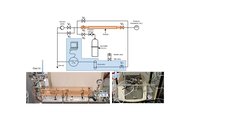Hy-Cleanup Project

This project investigates the purification of hydrogen gas contaminated with trace impurities during transport through natural gas pipelines—a critical challenge as the hydrogen economy expands. Hydrogen purity is application-dependent: while internal combustion engines tolerate lower purities, fuel cells are susceptible to contaminants such as CO and sulphur compounds, which poison the catalyst and reduce performance.
Our research aligns with ISO Standard 14687:2019, which defines strict impurity limits for hydrogen used in fuel cells. The various metal hydrides (MgH₂, NaAlH₄, Na₃AlH₆, etc.) are evaluated for their ability to remove impurities like CO (up to 100 ppm), H₂S (up to 250 ppm), and NH₃ from hydrogen streams. A flow-through tubular reactor containing metal hydride is used to purify hydrogen at room temperature and a flow rate of 50 ml/min. The hydride, pre-activated by high-energy ball milling, shows strong potential as an effective in-line purification material.
